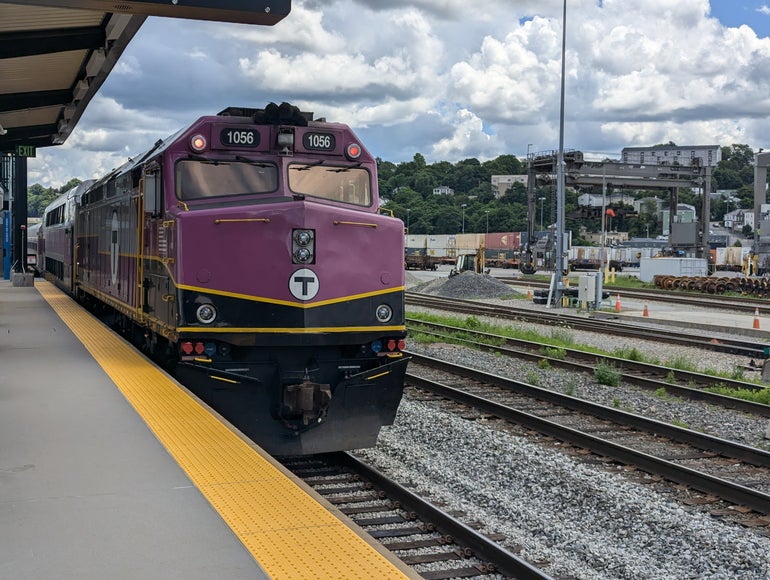The Massachusetts Senate on Thursday avoided making any changes to the controversial MBTA Communities Act while advancing a $1.3 billion spending bill packed with one-time investments in education and transportation.
The Senate voted 40-0 on a bill (S 2512) deploying surplus surtax revenues after a smattering of commentary about some pressure points and the adoption of dozens of earmarks following off-the-floor decision-making.
Over the course of deliberations, senators opted not to tweak the MBTA Communities Act, a zoning reform law that got little commentary when it was first enacted in 2021 but has since become a point of contention in the state’s response to a housing affordability crisis.
Sen. William Driscoll, a Milton Democrat, moved to resurface the debate by filing an amendment that would have excluded the Mattapan Line from being considered “rapid transit” under the law.
Milton officials have argued that they should not be classified as a rapid transit community, a designation that carries the heaviest zoning-reform lift under the law, because the only T stops within its boundaries are part of the Mattapan Line trolley.
Driscoll stood on the Senate floor with a trio of easels behind him displaying maps and language of the MBTA Communities Act, but before he began a 22-minute speech, he withdrew his amendment, preventing any of his colleagues from taking a recorded stance on whether Milton should be classified as a rapid transit community.
After taking any legislative action off the table, Driscoll argued that each single trolley vehicle on the Mattapan line can only transport about 130 people, less than the capacity of Green Line trolleys, heavy-rail subway lines or commuter rail trains.
Driscoll stressed that Milton leaders, who unsuccessfully challenged the constitutionality of the law, now are not seeking exemption but instead to be recategorized as an MBTA-adjacent community instead of one that hosts rapid transit.
“Chances are if we were included in the designation that most of the other communities are included in, you would never have heard of this issue,” he said.
Without debate, the Senate also shot down other amendments related to the MBTA Communities Act, including measures from Republican Sen. Kelly Dooner of Taunton that would give so-called adjacent communities an extra two years to come into compliance or create some defined exemptions from the law.
Revenue from the voter-approved surtax can only be spent on transportation or education investments, two areas that Senate budget chief Michael Rodrigues described as “cornerstones crucial to the commonwealth’s broader economic foundation and success.”
The Senate bill would direct $370 million toward the MBTA, a sizable investment but less than half as much as the House proposed in its version. Sen. Paul Feeney, a Foxborough Democrat, noted that he does not have subway service in his district but that the commuter rail “runs right through the heart of it.”
“It’s quite literally the engine that fuels economic activity for many, certainly throughout my district, and I know we all share that,” Feeney said. “We need it to be running efficiently and effectively, not limping and in flames.”
Senators rejected an amendment from Minority Leader Bruce Tarr that would have required the MBTA to, within the next year, craft and submit a “comprehensive plan” to achieve a state of good repair, then update the roadmap annually for at least five years.
The T in 2023 estimated it would cost $24.5 billion to fix all of its assets that at the time were not in a state of good repair.
The Senate tackled the majority of the 317 amendments to the bill with a pair of bundles, which rejected or adopted dozens of changes to the bill at once with a single unrecorded voice vote.
The “yes” mega-bundle added language calling on the MBTA to study expanding the commuter rail to Buzzards Bay and extending the Orange Line to Roslindale Village.
House and Senate Democrats will need to iron out differences in their approaches before the money can be put to use. Both versions of the bill would appropriate about $1.3 billion in surtax dollars, but the House wants to divide it up with $857 million for transportation and $405 million for education, while the Senate bill broke it down with $670 million for transportation and $617 million for education before amendments.
The surtax divide is one portion of a broader disagreement between the two branches on the scope of state aid to the MBTA. Combining the mid-year spending bill and the annual state budget, the House would provide the T with about $1.4 billion while the Senate across the same two bills would give the agency serving the Boston metro area and beyond roughly $820 million. That’s in addition to the T’s dedicated portion of the sales tax.
Sen. Robyn Kennedy of Worcester pointed Thursday to the Senate’s push for higher investments in the 15 regional transit authorities outside the T, contending that “advocating for more regional public transportation does not mean less for the MBTA.”
“When we invest in regional transportation, we invest in every community, every worker, every student who relies on our buses to get ahead,” Kennedy said while introducing an amendment that added $200,000 for Worcester Regional Transit Authority capital projects.
Another major spending debate is on the horizon. The Senate plans to begin considering its Ways and Means Committee’s $61.3 billion fiscal year 2026 state budget on Tuesday, May 20.

